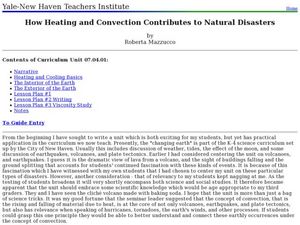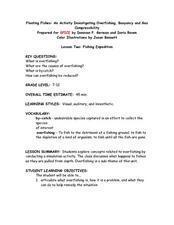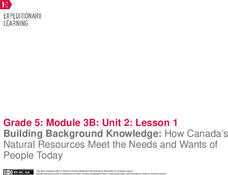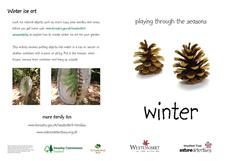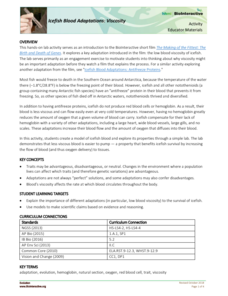Curated OER
Natural Selection.... a Cumulative Process... it's in the cards!
Learners working in pairs attempt to produce a full sequence of 13 cards of one suit (ace - to king). This must be done by shuffling the suit of cards for each round, then checking the cards.
Curated OER
Natural Resources Trick-or-Treat
Students explore that some resources are finite. They are able to deelop an understanding of commodities-some resources are worth more than others so companies choose to spend more money to find them. Students realize that some...
Curated OER
The Chips Are Down: A Natural Selection Simulation
Students, in teams, use different colored paper chips to represent prey and a piece of fabric as the environment.
Curated OER
How Heating and Convection Contributes to Natural Disasters
Students study the basics of heating and cooling and how it pertains to the earth. In this global lesson students read the Magic Tree House book then create a chart of their findings.
Curated OER
Basics of Environmental Science
Ninth graders explore environmental concerns of the community and identify the basic needs of people, wildlife and domestic animals. Working both individually and in groups, they also define natural resources and compare and contrast...
Edgate
Discovering New Resources
What is a natural resource, and what resources did the Lewis and Clark expedition seek? After reading an article on the mapping of the west, learners get into small groups to discuss the important natural resources of the period. They...
Curated OER
The Southwest
Science stars unscramble twelve terms associated with the landforms and natural resources of the southwest United States. Print out this worksheet and assign it to your middle school earth scientists. Have them write definitions for each...
Curated OER
Floating Fishes: Fishing Expedition
A referenced PowerPoint is not included, but this lesson can still make an impact with emerging environmentalists. After introducing them to the facts about overfishing, they experiment with a fishing simulation using colored beads and...
PBS
Stories of Painkiller Addiction: Contemplating Nature vs. Nurture
Does having an addict in your family make it more likely to become one yourself? Explore the genetic risk factors, as well as the prominent environmental influences, for substance addiction in a lesson that encourages awareness and open...
EngageNY
Building Background Knowledge: How Canada’s Natural Resources Meet the Needs and Wants of People Today
Learners follow along as the teacher reads Products of Mining in Canada: From Batteries to Vehicles aloud. They then discuss the meaning of key terms and determine the gist of the text. Pupils do a second read and complete a graphic...
NOAA
To Explore Strange New Worlds
It's time to boldly go where your class has not gone before! The introductory lesson in a five-part series takes young oceanographers aboard the NOAA Ship Okeanos to begin a study of ocean exploration. The lesson includes a comparison of...
Cornell Lab of Ornithology
Amazing Birds
What's so amazing about birds? Find out just how amazing birds are with a physics of animal behavior unit created by Cornell Lab of Ornithology. Have learners explore and tap into their observational skills and notice how birds fly, what...
Curated OER
How to Make a Wind Vane
Students measure the direction of the wind. For this Science lesson, students make their own wind vane. Students discuss the importance of wind direction and speed.
Curated OER
Winter Play Pack
Uncover the magic of winter using this winter play pack. Fold it into a book for learners to work through as they explore wildlife during the cold months. They create winter ice art, go on a scavenger hunt for various plants and animals,...
Center for Civic Education
Citizenship Schools and Civic Education During the Civil Rights Movement and in the Present
Your young historians will discover the importance that citizenship education has played in the social progress of the United States as they learn about early efforts to discourage African Americans from voting in the 1960s.
Curated OER
Materials - Who Wants to Be a Millionaire?
Play a game to review characteristics of different materials. Players will compare natural to man-made materials and how much light passes through them. They consider water and heat resistance as well. If you are preparing your class for...
Howard Hughes Medical Institute
Icefish Adaptations
What adaptations exist in order for icefish to survive the subfreezing temperatures of the Antarctic Ocean? Middle and high schoolers can find out through watching a related 13-minute video and performing a simple investigation to...
Nature Works Everywhere
Fishing for a Future
Teaching a man to fish has an environmental impact. Through a series of four lessons, learners study the science of fishery management. Their study involves analyzing data to develop a management strategy for specific fish and common...
Howard Hughes Medical Institute
Icefish Blood Adaptations: Viscosity
Most fish freeze to death when the water is too cold, yet some fish live in the Southern Ocean where the water is often below freezing. Scholars use two models representing the blood from most fish versus the blood from Antarctic fish....
Purdue University
Chirp! Chirp!
If you build it, they will come. Young scholars learn about local birds in an interesting hands-on instructional activity. They begin by identifying birds either from photos or in nature and then build their own bird feeders. The...
Scholastic
Spring Is Sprung: Water Movement in Plants
Young scientists use food coloring and celery stalks to determine how water travels through plants.
WE Charity
Elementary–Module 2: Circular Economy and Nature
How can people do their part to help protect the environment? Learners participate in an engaging jigsaw activity to discuss the causes and effects of pollution. Next, pupils develop their own innovative ideas to address an environmental...
Purdue University
Garden Surprise
View vegetables a little differently. A hands-on instructional activity begins by examining different vegetables and identifying the part of the plant they come from. Learners then create exploding seed balls they take home to grow their...
Horticultural Society of New York
Dress Up Your Salad
Salad dressings use a variety of different ingredients, but it's important to have a healthy balance of greens to create a delicious mix. Young chefs examine five types of herbs including chives, basil, dill, parsley, and thyme to make a...
Other popular searches
- History and Nature of Science
- The Nature of Science
- Nature of Science Biology
- Nature of Science Inquiry
- Nature of Science Physics
- History Nature of Science
- Science Patterns in Nature
- Genetics Nature of Science
- Teaching Nature of Science
- Nature of Science Weather
- Genetic Nature of Science
- Science and Nature





